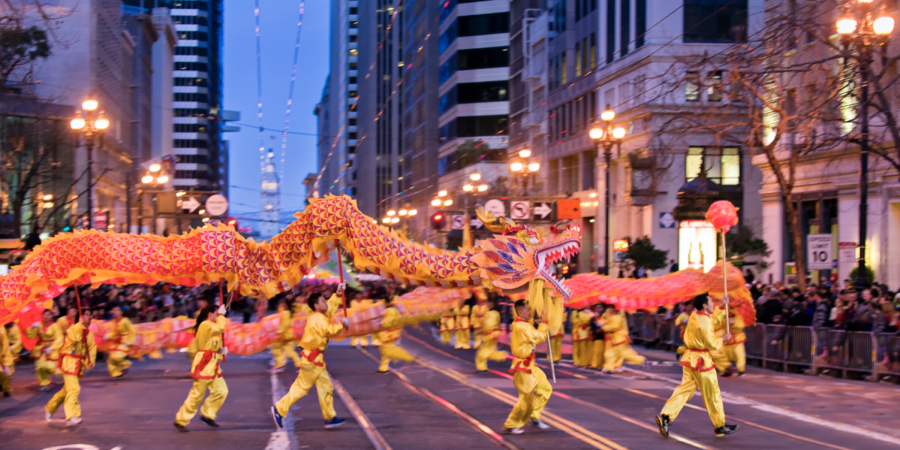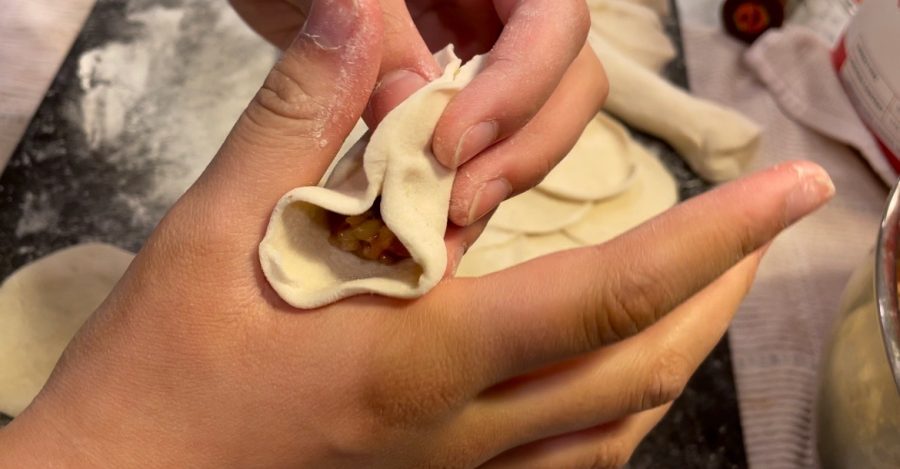Chinese Lunar New Year
The ICCSD school board has approved for a day off on Lunar New Year for the 2023-2024 calendars.
Boom Boom Boom, the drums beat loudly. Hundreds of people parade down the street, brilliant colors of gold and red blend together. Big dragons dance under the illuminated moon in the sky. The children’s chorus of laughter bounces through the neighborhood as they jump with lighted lanterns.
Lunar New Year is a day of festivities and joy with bright-lighted houses all in the neighborhood. Although each country has its own way of celebrating the Lunar New Year, we will be showing you how Chinese people celebrate this day in their own way.
The Iowa City Area Chinese Association created a petition to get a day off for Lunar New Year. They collected a total of 1,369 signatures, and on Nov. 23, 2021, the ICCSD school board approved for a day off on Lunar New Year for the 2023-2024 calendars. The approval might only mean a day off for some people, but to Chinese students at West, it means something completely different. Two juniors Heidi Du ’23 and Maya Chu ’23 said,
“Right now we don’t have a day off, so the only thing my family does is eat dinner,” Du said. “Having a day off would mean more time for me to hang out with my family and actually have a celebration,”
Du isn’t alone, as a lot of people from the Chinese community at West also feel underrepresented.
“I feel like it is really important that as many cultures as possible are represented in the ICCSD, they should definitely give us a day off to celebrate,” Chu said.
The Chinese community will now be able to spend a day celebrating their culture with loved ones at home. ICCSD has realized how important Lunar New Year is, but that is not the case for the majority of schools in America.
New York 6th district Chinese-American congresswoman Grace Meng proposed a bill on Jan. 28 to make Lunar New Year a federal holiday. She believes that the growing Asian Community deserves a day to celebrate the deeply rooted traditions of their culture.
“The Race of the 12 Animals,” tells the tale of how each lunar year was named. The Jade Emperor set a race for 12 animals to compete for the positions as the zodiacs. All the animals had to swim across the river and run to the finish line. The Rat won the race, and therefore got the title for the first year. The Ox came second, then the Tiger, Rabbit, Dragon, Snake, Horse, Goat, Monkey, Rooster, Dog, and last but not least, the Pig! Every year, families and friends celebrate in bright red clothes, some pulling up in fancy traditional clothes or some, just a plain old sweater. But one rule is for sure, it must be red, the color that symbolizes good fortune, vitality, prosperity, and celebration! Everyone is talking and laughing, and the atmosphere is relaxed. Talking to your loved ones is definitely a big part of the New Year.
“Lunar New Years means being able to have a good time to talk to my grandparents from China, who I don’t have very much time to talk to, and spending time with my family,” said Junze Sun ’25
During these gatherings, delicious foods are being cooked, baked, stewed, steamed, and roasted.
“Picture this, savory rich aroma wafting from the kitchen. The fried crispy duck, so scrumptious,” said Anjali Lodh, ’25. Food, for many students, is the best part of the night, “I’ve got to say, sitting down at the dinner table and eating food is the best part,” said Derek Hua ’25.
The adults’ booming laughter fills the house at parties. The dishes get placed on the table and your eyes see a big fish, dumplings with all sorts of fillings, duck, green vegetables fried with oil, plates of small dishes swimming around in sauces, long noodles, spring rolls, and rice. For dinner with just families, a hot pot is always a classic.
After dinner, the moms carry out desserts like Tang Yuan (tang-u-wan), a sweet bean paste dessert, or fruit.
At the end of the night, when all the bellies have been filled with food, grandmas, grandpas, aunts, uncles, moms, and dads hand out small red envelopes. “I like the money, hongbao, they are little bundles of joy,” Hong said. hongbao (red pocket money) are usually the highlight for the kids,
“I get a lot of money from my grandparents, but my parents took it away,” said Sun. He isn’t the only one who receives more money from his grandparents than his parents,
“My parents forgot, but my grandparents usually give me a hefty amount,” said Hua.
As Chinese-Americans living in the States, grandparents usually don’t send money through the mail. Instead, they send hongbao (red pocket money) through a popular texting app called WeChat. Sending little GIFs or emojis through WeChat is also extremely popular, and often families call each other through the app.
Many also stream the extremely popular New Year Gala on China Central television. The New Year Gala has a variety of performances, from singing and dancing to comedy and skits to welcome the upcoming year.
“My family and I watch it every year,” said Sabrina Du ’25. “It’s a tradition.”
Lunar New Year is a big day, celebrated by over 1.5 billion people all over the world. It is a deeply rooted tradition that stays firm in the households that celebrate it. To some, Lunar New Year doesn’t mean anything, but to the Chinese community at West, it means everything.
“Lunar New Year means culture, it means family, and it means yummy food,” said Lodh.
Your donation will support the student journalists of West High School. Your contribution will allow us to purchase Scholarship Yearbooks, newsroom equipment and cover our annual website hosting costs.

Anna Song is a senior entering her final year on the West Side Story staff! This year she will be the Design Editor for the print newspaper. Outside the...

Gianna Liu is a senior at West High. This is her third year on staff and she is the Print Co-Editor-in-Chief. When Gianna isn't busy taking photos or writing...

Gianna Liu is a senior at West High. This is her third year on staff and she is the Print Co-Editor-in-Chief. When Gianna isn't busy taking photos or writing...




